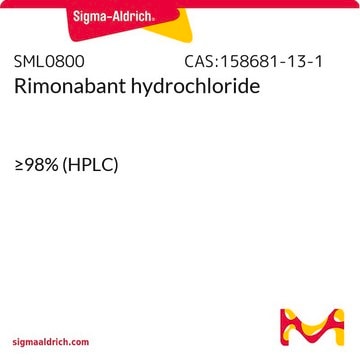SML2710
ZCZ011
≥98% (HPLC)
Synonym(s):
6-Methyl-3-(2-nitro-1-(thiophen-2-yl)ethyl)-2-phenyl-1H-indole, 6-Methyl-3-[2-nitro-1-(2-thienyl)ethyl]-2-phenyl-1H-indole, ZCZ 011, ZCZ-011
Sign Into View Organizational & Contract Pricing
All Photos(1)
About This Item
Empirical Formula (Hill Notation):
C21H18N2O2S
CAS Number:
Molecular Weight:
362.44
MDL number:
UNSPSC Code:
12352200
NACRES:
NA.77
Recommended Products
Quality Level
Assay
≥98% (HPLC)
form
powder
color
white to beige
solubility
DMSO: 2 mg/mL, clear
storage temp.
2-8°C
Biochem/physiol Actions
ZCZ011 is a brain-penetrant, cannabinoid receptor CB1-selective positive allosteric modulator (PAM) that enhances orthosteric agonist CP55,940, while reduces orthosteric inverse agonist SR141716A, CB1 binding. ZCZ011 potentiates AEA-stimulated GTPγS binding (Emax = 46.5% without vs. 115.2% with 100 nM ZCZ011; mouse brain membranes) and cellular signaling (β-arrestin Emax = 100% without vs.157% with 100 nM ZCZ011, pERK pIC50 = 6.5 without vs. 8.3 with 10 nM ZCZ011; hCB1 cells). ZCZ011 exhibits antinociceptive efficay in murine chronic constriction injury (CCI) model of neuropathic pain & carrageenan model of inflammatory pain (40 mg/kg i.p.) without cannabimimetic side-effects.
Storage Class Code
11 - Combustible Solids
WGK
WGK 3
Flash Point(F)
Not applicable
Flash Point(C)
Not applicable
Certificates of Analysis (COA)
Search for Certificates of Analysis (COA) by entering the products Lot/Batch Number. Lot and Batch Numbers can be found on a product’s label following the words ‘Lot’ or ‘Batch’.
Already Own This Product?
Find documentation for the products that you have recently purchased in the Document Library.
Noureldin Saleh et al.
Angewandte Chemie (International ed. in English), 57(10), 2580-2585 (2018-01-10)
The cannabinoid CB1 receptor (CB1R) is an abundant metabotropic G-protein-coupled receptor that has been difficult to address therapeutically because of CNS side effects exerted by orthosteric drug candidates. Recent efforts have focused on developing allosteric modulators that target CB1R. Compounds
Enantiomer-specific positive allosteric modulation of CB1 signaling in autaptic hippocampal neurons.
Jose Mitjavila et al.
Pharmacological research, 129, 475-481 (2017-11-22)
The cannabinoid signaling system is found throughout the CNS and its involvement in several pathological processes makes it an attractive therapeutic target. Because orthosteric CB1 cannabinoid receptor ligands have undesirable adverse effects there has been great interest in the development
K R Trexler et al.
Pharmacology, biochemistry, and behavior, 177, 27-33 (2019-01-01)
Recently, multiple compounds have been synthesized that target the allosteric binding site(s) of CB1. These CB1 positive allosteric modulators may capture the benefits of cannabinoid receptor activation without unwanted psychoactive effects, such as sedation. For example, ZCZ011 blocks neuropathic pain
Chih-Chung Tseng et al.
Journal of medicinal chemistry, 62(10), 5049-5062 (2019-05-06)
The first generation of CB1 positive allosteric modulators (e.g., ZCZ011) featured a 3-nitroalkyl-2-phenyl-indole structure. Although a small number of drugs include the nitro group, it is generally not regarded as being "drug-like", and this is particularly true for aliphatic nitro
Kaavya Krishna Kumar et al.
Cell, 176(3), 448-458 (2019-01-15)
Cannabis elicits its mood-enhancing and analgesic effects through the cannabinoid receptor 1 (CB1), a G protein-coupled receptor (GPCR) that signals primarily through the adenylyl cyclase-inhibiting heterotrimeric G protein Gi. Activation of CB1-Gi signaling pathways holds potential for treating a number of
Our team of scientists has experience in all areas of research including Life Science, Material Science, Chemical Synthesis, Chromatography, Analytical and many others.
Contact Technical Service








